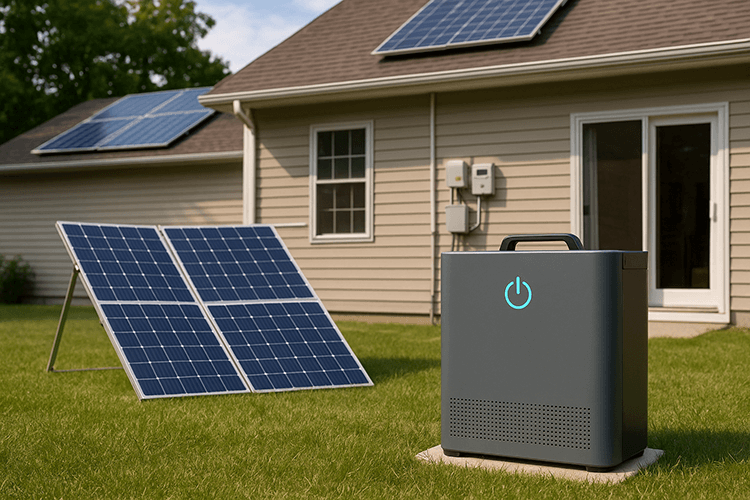Back Up Solar Power: A Reliable Solution for Energy Security at Home
As power outages and energy uncertainty become more common across the globe, many homeowners are searching for reliable, long-term alternatives to traditional electricity. One solution rising to the forefront is back up solar power—a clean, efficient, and dependable way to maintain uninterrupted electricity at home. Whether due to natural disasters, grid instability, or the desire for energy independence, back up solar power offers an effective strategy to keep your essential devices running when it matters most.
What is Back Up Solar Power?
Back up solar power refers to a solar-powered energy system equipped with battery storage that can continue to supply electricity during power outages. Unlike standard grid-tied solar systems, which shut down when the grid fails, backup systems store solar energy in batteries for later use—ensuring power is always available, regardless of grid conditions.
A complete system typically includes:
- Photovoltaic (PV) solar panels to collect sunlight
- An inverter to convert direct current (DC) from the panels into alternating current (AC)
- Solar batteries (usually lithium-based) for storing excess energy
- Charge controllers and transfer switches to manage power flow and switching during outages
Why is Back Up Solar Power Important?
🔋 1. Power Security
With increasing grid failures, blackouts, and natural disasters, a back up solar power system ensures that critical appliances like refrigerators, internet routers, and medical devices stay operational.
🌎 2. Sustainable Living
Solar energy is clean and renewable. Unlike fuel-based generators that emit carbon dioxide and require regular refueling, solar backup systems operate silently and without pollution.
💸 3. Cost Savings
Though the initial investment may seem high, back up solar power systems offer substantial savings over time by reducing utility bills and avoiding fuel costs. Some regions even offer government rebates and tax incentives to make them more affordable.
🏡 4. Energy Independence
Relying less on the grid gives you more control over your power usage and costs. With solar battery storage, you can use your energy when it's most needed, including during peak hours when electricity prices rise.

Key Components of a Back Up Solar Power System
1. Solar Panels
These are the foundation of any solar system, responsible for converting sunlight into electricity. The number and type of panels depend on your household's energy needs and available space.
2. Inverter
The inverter plays a vital role by converting the DC electricity generated by the panels into AC electricity used by most household appliances. Some systems use hybrid inverters that also manage battery charging and discharging.
3. Battery Storage
Batteries store unused electricity generated during the day for later use, such as during nighttime or blackouts. Lithium iron phosphate (LiFePO4) batteries are the preferred choice for home backup due to their longer lifespan, safety, and efficiency.
4. Charge Controller
This component regulates the flow of electricity from the solar panels to the batteries, preventing overcharging and optimizing battery performance.
5. Transfer Switch
Installed near the main electrical panel, the transfer switch automatically activates the backup power during an outage, ensuring a seamless transition from grid to battery.
Applications of Back Up Solar Power
Back up solar power systems are incredibly versatile, making them suitable for various scenarios:
🏕️ Outdoor and Remote Living
Whether you're in a cabin, RV, or an off-grid home, solar backup ensures uninterrupted electricity. It’s especially useful in areas with no utility infrastructure.
🏠 Home Emergencies
Natural disasters can damage grid infrastructure, leaving homes without electricity for days. Back up systems can power vital appliances like freezers, sump pumps, and communication tools.
🎥 Outdoor Events and Live Streaming
If you're a content creator or host outdoor events, solar power systems can run lighting, cameras, audio gear, and laptops.
👷 Job Sites and Construction
In locations where traditional power access is unavailable, solar generators can run tools and devices necessary for fieldwork, improving productivity without noise or emissions.
👨⚕️ Medical Emergency Preparedness
Devices like CPAP machines, nebulizers, or oxygen concentrators require stable power. With a solar backup system, these life-sustaining machines stay operational when power is out.
How Much Back Up Solar Power Do You Need?
Before purchasing a back up solar power system, it’s essential to calculate how much electricity your household typically uses during an outage. Here’s a basic guide:
| Appliance | Power (Watts) | Daily Use (Hours) | Daily Energy (Wh) |
|---|---|---|---|
| LED Lights (5 bulbs) | 50W | 5h | 250Wh |
| Wi-Fi Router | 10W | 24h | 240Wh |
| Laptop | 60W | 5h | 300Wh |
| Refrigerator | 150W | 24h | 1800Wh |
| CPAP Machine | 40W | 8h | 320Wh |
Total daily energy need: ~2.9 kWh
With this estimate, you can choose a battery size and number of solar panels that support your specific usage pattern.
Types of Back Up Solar Power Systems
🧳 Portable Solar Power Stations
- Ideal for camping, road trips, or light backup use
- Easy to carry and set up
- Limited power output (300W–1000W)
- Often includes built-in inverters and lithium batteries
🏡 Home-Based Solar Backup Systems
- Permanently installed with higher capacity
- Supports multiple circuits or whole-home backup
- Scalable with additional panels and batteries
- Works seamlessly with or without the grid
Advantages Over Gas Generators
| Feature | Solar Backup System | Gas Generator |
|---|---|---|
| Fuel | Sunlight (free) | Gasoline/diesel (paid) |
| Noise | Silent | Noisy |
| Maintenance | Minimal | Frequent (oil, filters) |
| Emissions | Zero | High |
| Indoor Use | Yes | No (fumes) |
| Lifespan | 10+ years | 3–5 years |
Factors to Consider Before Buying Backup Solar Power
✅ Battery Chemistry
Lithium iron phosphate batteries are safer and last longer than traditional lithium-ion or lead-acid options.
✅ Storage Capacity (kWh)
Choose a battery with enough capacity to meet your essential power needs for at least one full day.
✅ Solar Input
Ensure your solar panel wattage is sufficient to recharge your battery in one sunny day.
✅ Scalability
Opt for modular systems that let you expand storage or panel size as your energy needs grow.
✅ Smart Monitoring
Many advanced systems come with mobile apps or web dashboards, allowing you to track energy usage, battery status, and solar generation in real-time.
Backup Solar Power Installation Tips
- Site Assessment: Analyze sun exposure and roof space or ground mount area.
- Licensed Installer: Use certified professionals to ensure compliance with electrical codes and warranty coverage.
- Local Permits: Some regions require permits for installation—your installer can help with this process.
- Battery Placement: Store batteries in a well-ventilated, climate-controlled area to extend their life.
Incentives and Tax Benefits
Depending on your location, you may be eligible for:
- Federal Solar Investment Tax Credit (ITC) – up to 30% off installation costs
- State and Local Rebates
- Net Metering Programs
- Zero-Interest Financing Options
These incentives can significantly reduce your out-of-pocket cost and accelerate your return on investment.
FAQs – People Also Ask About Back Up Solar Power
Q: Can I power my entire house with back up solar power?
A: Yes, but it depends on system size and your energy usage. Whole-house systems require large battery banks and sufficient solar input.
Q: How long does the battery last during an outage?
A: It varies, but most systems provide 8–24 hours of backup power, depending on usage and capacity.
Q: Can I add a backup battery to my existing solar system?
A: In many cases, yes. Talk to your solar provider to see if your current setup supports battery retrofitting.
Q: How often do I need to replace the battery?
A: Quality lithium batteries (like LiFePO4) can last 10+ years with proper maintenance.
Conclusion
Back up solar power is no longer a luxury—it’s becoming a necessity in today’s energy landscape. With increasing outages, rising utility costs, and a shift toward sustainable living, installing a solar-powered backup system is a wise investment for both peace of mind and long-term savings.
Whether you're preparing for emergencies, going off-grid, or simply taking control of your home’s energy, back up solar power provides a quiet, clean, and dependable solution. With a range of options available—from portable units to whole-home installations—you can find a system tailored to your lifestyle and energy needs.

